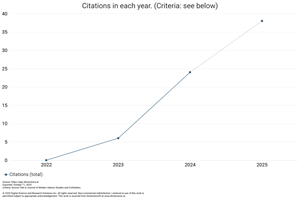Application of Usul Fiqh Rules to the Phenomenon of Online Marriage Contracts
DOI:
https://doi.org/10.59653/jmisc.v1i01.5Keywords:
Fiqh rules, al-masyaqqah, online marriageAbstract
Current technological developments are leading society towards the globalization of telecommunications, media and informatics. In the current condition, there are many problems that arise in a contract through electronic media, for example, online marriages where consent and consent transactions are carried out through connectivity or activities that are connected to a network or internet system (via online). Starting from the problems above, Fiqh as a product of human thought related to Islamic law must be able to provide juridical answers to changes that occur in society. Therefore, opportunities for Fiqh studies must always be open, and must be carried out by taking into account the social implications of the application of the products of legal thought, while maintaining their relevance to the will of the Qur'anic doctrines regarding human behavior.
Downloads
References
Ab. Rahim, H., Ahmad, H., & Ab. Rahim, M. H. (2020). Theoretical Concept of Istihalah in Gelatine Application: a Review. International Social Science and Humanities Journal, 3(1).
Analiansyah, & Ulfatun, C. (2020). The public policy implementation on the pre-marital screening for prospective bride and groom (A study on the implementation of the regulation of the regent of Pidie, Aceh, number 54/ 2018). In Samarah (Vol. 4, Issue 2). https://doi.org/10.22373/sjhk.v4i2.7937
Elaryh Makki Dafalla, M., Mokhtar, R. A., Saeed, R. A., Alhumyani, H., Abdel-Khalek, S., & Khayyat, M. (2022). An optimized link state routing protocol for real-time application over Vehicular Ad-hoc Network. Alexandria Engineering Journal, 61(6). https://doi.org/10.1016/j.aej.2021.10.013
Jalil, A. (2019). Implementasi Program Bimbingan Perkawinan Pranikah bagi Calon Pengantin di KUA Kecamatan Cilandak Kota Jakarta Selatan. Andragogi: Jurnal Diklat Teknis Pendidikan Dan Keagamaan, 7(2). https://doi.org/10.36052/andragogi.v7i2.93
Kamali, M. H. (2011). Islamic Family Law Reform: Problems and Prospects. ICR Journal, 3(1). https://doi.org/10.52282/icr.v3i1.579
Karimi, R., Bakhtiyari, M., & Masjedi Arani, A. (2019). Protective factors of marital stability in long-term marriage globally: a systematic review. Epidemiology and Health, 41. https://doi.org/10.4178/epih.e2019023
Kinasih, S. E., Koesbardiati, T., & Mas’udah, S. (2019). Javanese women under a marriage contract in Indonesia. Opcion, 35(Special Issue 22).
Lamatande, R., Bombang, S., & Akbar, A. (2019). The Approval of the Guardians of Children Resulted from the Marriage of Pre-marrital Pregnancy Women. INTERNATIONAL JOURNAL OF CONTEMPORARY ISLAMIC LAW AND SOCIETY, 1(1). https://doi.org/10.24239/ijcils.vol1.iss1.6
Miri, M., & Moghadam, H. M. (2018). Determinants of marriage to first birth interval in Birjand, Iran: A retrospective-prospective cohort and survival analysis. International Journal of Women’s Health and Reproduction Sciences, 6(3). https://doi.org/10.15296/ijwhr.2018.54
Mufid, M. (2020). Green Fatwas in Bahtsul Masail: Nahdlatul Ulamas Response to the Discourse of Environmental Crisis in Indonesia. Al-Ihkam: Jurnal Hukum Dan Pranata Sosial, 15(2). https://doi.org/10.19105/al-lhkam.v15i2.3956
Muksalmina, M., Muntasir, M., Rasyidin, R., & Mulyadi, M. (2021). Online Marriage Registration Service Policy Through Simkah Web for Prospective Bride and Groom in The Office of Religious Affairs, Banda Sakti District, Lhokseumawe City. Malikussaleh Social and Political Reviews, 2(2). https://doi.org/10.29103/mspr.v2i2.6341
Naixin, H. (2019). Revisiting the legal nature and content of a marriage contract in the modern law of the PRC. Humanities and Social Sciences Reviews, 7(5). https://doi.org/10.18510/hssr.2019.75133
Nurdin, R., Yusuf, M., & Natasya, S. S. (2021). The gayonese culture of marriage system: The islamic law perspective. Samarah, 5(1). https://doi.org/10.22373/sjhk.v5i1.9257
Pre-Marriage Course Regarding Health Reproductive: Knowledge and Attitude of Bride and Groom Candidate in Preparing Health Status before Pregnant in Grobogan Regency. (2020). Indian Journal of Public Health Research & Development. https://doi.org/10.37506/ijphrd.v11i3.1564
Rahmadi, F., Nuruddin, A., & Yuslem, N. (2017). A Novelty of Perspective of Fikih and PP No. 17 1965 for Status of Ownership of Life Insurance in Claims Fund. Journal of Social Science Studies, 4(2). https://doi.org/10.5296/jsss.v4i2.11203
Sujono, I. (2022). Legal Review of Marriage for Divorced Women Outside the Religious Courts. International Journal of Islamic Thought and Humanities, 1(1), 1–16. https://doi.org/10.54298/ijith.v1i1.10
Syatar, A., & Bakry, M. (2021). Is It Possible to Perform Online Marriage during COVID-19 Outbreak? Kresna Social Science and Humanities Research, 1. https://doi.org/10.30874/ksshr.20
Yang, X., & Chen, X. (2023). Design of Internet of Things Information Interactive Perception System Based on 5G Mobile Communication Technology in a Hospital Network. Journal of Testing and Evaluation, 51(1). https://doi.org/10.1520/JTE20210445
Yasa, A. (2015). The development of Indonesian Islamic law: A historical overview. Journal of Indonesian Islam, 9(1). https://doi.org/10.15642/JIIS.2015.9.1.101-122
Downloads
Published
How to Cite
Issue
Section
License
Copyright (c) 2023 Ida Halimatus Sakdiyah

This work is licensed under a Creative Commons Attribution-ShareAlike 4.0 International License.
Authors who publish with this journal agree to the following terms:
- Authors retain copyright and grant the journal right of first publication with the work simultaneously licensed under a Creative Commons Attribution-ShareAlike that allows others to share the work with an acknowledgement of the work's authorship and initial publication in this journal.
- Authors are able to enter into separate, additional contractual arrangements for the non-exclusive distribution of the journal's published version of the work (e.g., post it to an institutional repository or publish it in a book), with an acknowledgement of its initial publication in this journal.
- Authors are permitted and encouraged to post their work online (e.g., in institutional repositories or on their website) prior to and during the submission process, as it can lead to productive exchanges, as well as earlier and greater citation of published work (See The Effect of Open Access).
























